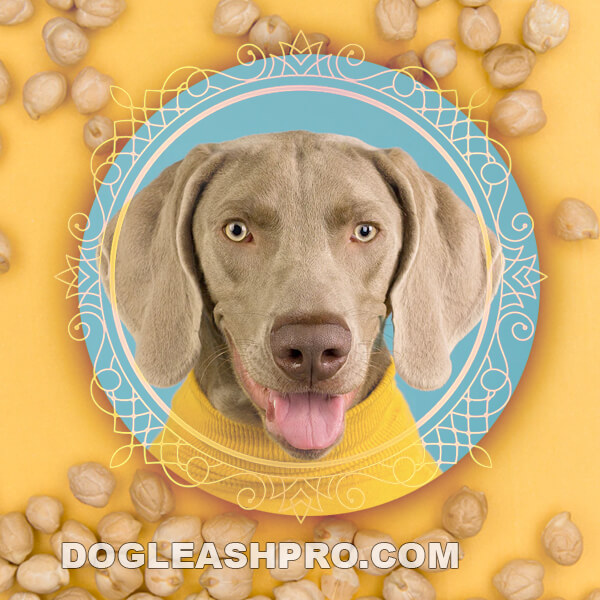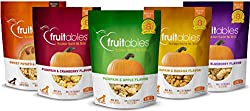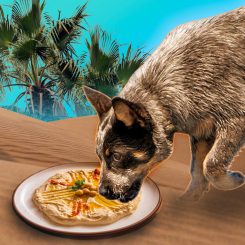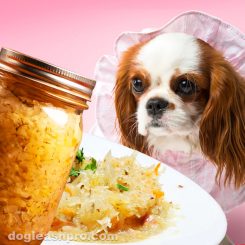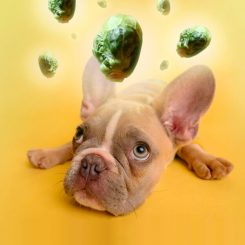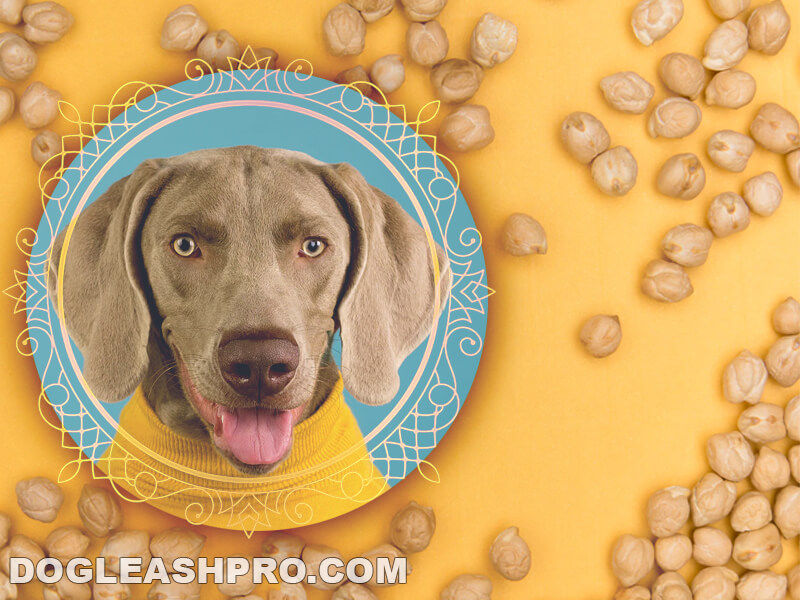
Can dogs eat Chickpeas? Yes, dogs can eat Chickpeas in moderation as long as the Chickpeas are fully cooked, are plain without any seasonings or flavors, and are not canned Chickpeas.
As more people look for alternative sources of protein in their diets, Chickpeas have become a popular choice. And as dog owners, it’s natural to wonder whether our furry friends can partake in this nutritious and versatile food as well.
And did you know that Chickpeas are one of the main ingredients in Hummus spread? If you’re cooking Chickpeas or using them in dishes, can your dogs have some? Are Chickpeas safe for dogs to eat? In this article, we will explore the nutritional value in Chickpeas and whether they are safe for dogs to eat before we share them with our pets.
Table of Contents
Can dogs have Chickpeas?
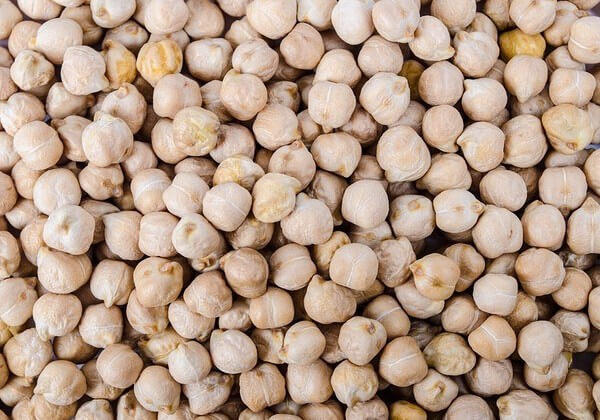
Yes, dogs can have Chickpeas in moderation because Chickpeas are safe for doggy consumption. In fact, you can find Chickpeas in dog food or in other pet food. Let’s discuss whether Chickpeas are good and healthy for dogs and when can they be bad for dogs.
Are Chickpeas good for dogs?
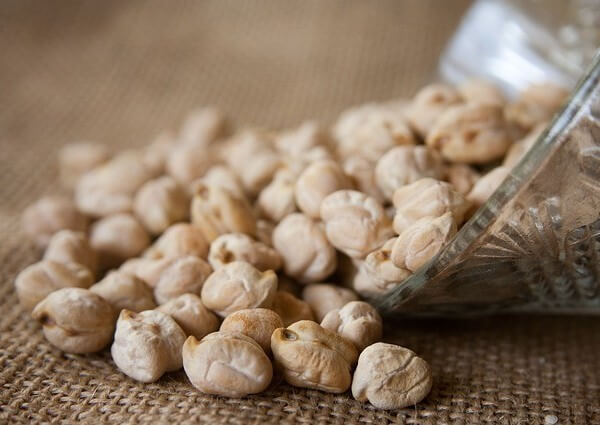
Yes, Chickpeas are good for dogs, but be sure that dogs eat Chickpeas in moderation. We highly recommend that dogs eat only a tiny portion of these legumes. Dog owners can add a small number of Chickpeas to their furry friend’s diet and their pups will reap plenty of health benefits. That’s because Chickpeas are packed full of the following goodness:
- Vitamin A.
- Vitamin B6.
- Vitamin C.
- Vitamin K.
- Choline.
- Copper.
- Fiber.
- Folate.
- Iron.
- Magnesium.
- Manganese.
- Phosphorus.
- Potassium.
- Protein.
- Saponins.
- Selenium.
- Zinc.
Health benefits of Chickpeas for dogs
As you can see, Chickpeas contains tons of vitamins and minerals that are great for your canine friends. Chickpeas also contain protein and fiber, both of which our four-legged friends need.
Let’s dive in and find out how Chickpeas can help with many of the common health problems found in dogs:
Diabetes
If your dogs have diabetes, avoid food that contains simple carbs. Instead, try adding some Chickpeas to their meal. Chickpeas contain complex carbohydrates which prevent the sudden spike or drop in blood glucose levels.
A sudden spike in blood glucose levels causes dogs to become very energetic and playful and when their blood sugar level drops, they suddenly feel tired or down which is not good.
When dogs eat Chickpeas in moderation, they will have and maintain energy for several hours. That’s because complex carbs release energy slowly unlike simple carbs.
Canine obesity
Adding a few Chickpeas to your four-legged friends’ diet can be beneficial. This is especially true if your pooch is obese. As mentioned before, Chickpeas are packed full of fiber and food that contains high levels of fiber will leave your pooch feeling full for a long period of time after a meal.
This is one of the ways to help get your pups back on track with weight management and prevent obesity in dogs. Your pups won’t be barking at you every 20 minutes to feed them food.
It’s no wonder why Chickpeas are also found in commercial dog food.
Heart issues and high blood pressure
Since Chickpeas are high in potassium and low in sodium, they can help dilate blood vessels in dogs. The combination of high potassium and low sodium helps maintain a healthy heart and aid in lowering blood pressure.
If your pooch has high blood pressure, Chickpeas can help lower the cholesterol amount in their blood since these small beans are fiber-rich.
Cancer
While Chickpeas won’t directly cure cancer in dogs, they are packed full of vitamins and minerals that can help prevent cancer. How?
First, Chickpeas contain selenium which helps the liver function and detoxify any cancer-causing agents and disrupt the growth of tumors.
Second, saponins and folate in Chickpeas can help prevent the formation and multiplication of cancer cells.
Third, thanks to the Vitamin C found in Chickpeas, it helps fight against free radicals in order to protect the cells from damage.
Anal gland issues and constipation
Since Chickpeas contain high levels of fiber, it is great for dogs with constipation and anal gland issues. The fiber in Chickpeas helps prevent constipation by promoting healthy and smooth bowel movements.
Pet owners should include fiber in their dogs’ diet if their pups have anal gland issues. The fibrous diet can promote properly formed stool and this will aid in anal gland expression.
Chronic inflammation
If you have a senior dog that is suffering from pain such as osteoarthritis, then Chickpeas can help since they contain choline. Choline can help keep your arthritic pooch comfortable by:
- Aiding in the transmission of nerve impulses.
- Assisting in fat absorption.
- Reducing chronic inflammation.
- Maintaining the structure of the cell membrane.
So, are Garbanzo Beans good for dogs?
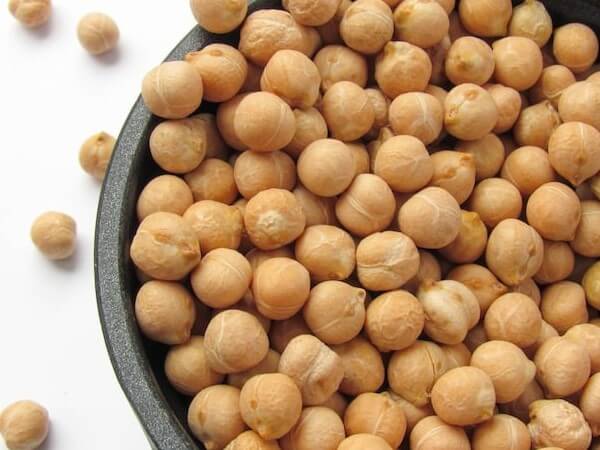
As we can see, Garbanzo beans (also known as Chickpeas), can be a healthy addition to a dog’s diet when fed in moderation.
These legumes are an excellent source of protein, fiber, and essential vitamins and minerals that can support a dog’s overall health and well-being.
From our explanation above, we can see that Garbanzo Beans contain vitamins such as vitamin A, vitamin B6, and vitamin C. Garbanzo Beans also contain minerals like iron, magnesium, and potassium, all of which are crucial for healthy muscle function, nerve function, and bone health.
While Chickpeas can provide a ton of health benefits to our canine pals, are there situations when Chickpeas are bad for dogs? Let’s find out!
Are Chickpeas bad for dogs?
Yes, Chickpeas can be bad for dogs, especially dogs that are gassy such as Bulldogs. Bulldogs get a lot of gas build up in their digestive tract because they swallow a lot of air when they eat. But that’s a whole other story.
For now, it’s important to note that Chickpeas can cause bloating and abdominal cramps or pain. If you know your pooch gets gassy rather quickly, avoid feeding them Chickpeas or only give them one or two Chickpeas.
If this is your dog’s first time eating Chickpeas, it’s best to introduce these legumes to them in small amounts and see how they react. Dogs that react with gastrointestinal issues like farting excessively, bloating, or abdominal pain should not eat Chickpeas again.
It’s ok if you’re not sure whether your puppy is sensitive to Chickpeas or not. You can call your dog’s vet and ask for their professional advice and suggestion. Before you introduce any new food to your pooch, feel free to consult with your vet. Your vet knows your dog the best and will let you know whether Chickpeas are safe for your dogs to eat.
You may be interested in: Puppy Has Diarrhea But Still Playful
Are Chickpeas safe for dogs?
Yes, Chickpeas are safe for dogs if they are fully cooked and plain without any added seasonings or flavoring. Are Chickpeas okay for dogs? Chickpeas are okay for dogs that do not have Chickpea allergies or are not sensitive to the amount of fiber in these legumes.
However, there are cases when Chickpeas may not be safe for dogs.
One such case is when Chickpeas are highly processed. The Chickpeas in Hummus are highly processed so dogs should avoid Hummus at all costs. On top of that, Hummus contains tons of seasonings and spices such as garlic and onions that are extremely toxic to dogs.
Dogs and Chickpeas
Chickpeas come in various forms, including canned, dried, and roasted. While all these types of Chickpeas are safe for human consumption, it’s important to note that our four-legged friends should only be fed cooked and plain Chickpeas.
Avoid feeding your furry friends seasoned or spiced Chickpeas, and stick to moderation to prevent digestive issues.
Below, we will discuss in more details whether our furry pals can enjoy these various forms of Chickpeas and how much they can have.
Can dogs eat canned Chickpeas?
No, dogs should not eat canned Chickpeas. This is another case when Chickpeas are not safe for doggy consumption. That’s because canned Chickpeas are brine in salt water so they are high in sodium. In addition to sodium, there can be other preservatives added in the can in order to extend the shelf life.
You can usually find out what the Chickpeas are preserved in by checking the can’s nutrition label and ingredients.
Even if you try rinsing the canned Chickpeas with fresh water to wash off the salt, there will still be some salt remaining on these legumes. Keep in mind that a 33-pound dog should only consume 100mg of salt each day.
Depending on how much salt your dog has already consumed that day, eating canned Chickpeas that’s packed full of salt can tip over their salt intake limit for the day and cause sodium poisoning in dogs.
Signs and symptoms of salt poisoning in dogs include:
- Dehydration or extreme thirst.
- Frequent urination.
- Nausea leading to vomiting.
- Diarrhea.
- Loss of appetite.
- Feeling lethargic.
- Walking in a drunk-like manner.
- Fluid accumulation inside the dog’s body.
- Potential kidney failure.
- Muscle tremors.
- High blood pressure.
- Seizures (in severe cases).
- Coma (in severe cases).
If you notice any of these signs or symptoms, be sure to contact your dog’s vet immediately. Salt poisoning requires immediate medical attention and the earlier it is treated, the better.
If you know your four-legged friend has either high blood pressure or kidney failure, avoid feeding them canned Chickpeas. Your pup needs a low salt diet and canned Chickpeas can be harmful to their health. In this situation, it’s best to keep canned Chickpeas away from your pooch.
Question of the day: If your dog is acting drunk and wobbly, what may be causing it? Check out My Dog Is Acting Drunk And Wobbly to find out!
Can dogs eat roasted Chickpeas?
Yes, dogs can eat plain roasted Chickpeas in small amounts. Roasted Chickpeas should not have any toxic flavorings on them such as garlic, onion, salt, or pepper. These flavorings are dangerous to dogs and cause the following:
- Sodium poisoning.
- Garlic poisoning.
- Onion poisoning.
Therefore, ideally, you would be roasting the Chickpeas yourself so you know that the roasted Chickpeas are plain with no added flavorings.
Many roasted Chickpeas we find at our local grocery store or supermarket contain tons of ingredients that are not safe for our canine friends.
For instance, according to U.S. Department of Agriculture, roasted Chickpeas contain the following ingredients:
- Roasted Chickpeas.
- Expeller-pressed Safflower Oil.
- Sugar.
- Maltodextrin.
- Hot Sauce (Aged Red Peppers, Vinegar, Salt, Garlic Powder).
- Paprika.
- Spice.
- Yeast Extract.
- Vinegar.
- Garlic Powder.
- Onion Powder.
- Sea Salt.
- Natural Flavors.
- Tocopherols.
Most of these ingredients on the list are not safe for doggy consumption.
Next, let’s take a look at the nutritional profile of roasted Chickpeas:
Nutritional Profile of roasted Chickpeas (1 ounce or 28 grams)
| Name, Unit | Amount |
| Calories, cal | 120 |
| Sugar, g | 2 |
| Sodium, mg | 94.9 |
| Carbohydrate, g | 18 |
| Total Fat, g | 3 |
| Protein, g | 6 |
| Fiber, g | 5.01 |
| Iron, mg | 1.44 |
As we can see, just 1 ounce or 28 grams of roasted Chickpeas has about 120 calories, 3 grams of fat, and 18 grams of carbohydrate (2 grams of sugar).
This is why we need to be very careful with how much roasted Chickpeas we are feeding our canine friends.
Allowing our dogs to eat just 1 ounce of roasted Chickpeas is enough to cause sodium poisoning in dogs since there is about 95 mg of sodium. Although that may not be a lot for us, that is considered a lot of sodium intake for our four-legged friends.
Regularly giving our pups roasted Chickpeas can also lead to weight gain, diabetes, and a host of other health issues.
While there are 6 grams of protein, 5 grams of fiber, and 1.44 mg of iron, it’s best that your canine friends receive them from another healthier food source like raw or cooked cabbage or from healthy dog-friendly fruits.
If you’re having roasted Chickpeas and your precious pooch want some, it’s best to give them dog-friendly snacks. My two furry family members love these and can’t get enough. Whenever they hear me opening the Fruitable dog treat bags, they come running and spinning in circles with excitement.
Can dogs eat raw Chickpeas?
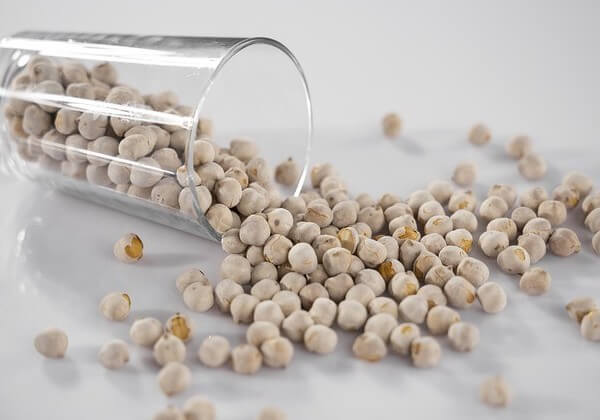
No, dogs should not eat raw Chickpeas. Raw Chickpeas are dried so they are hard and can become a choking hazard. The raw Chickpeas can get lodge in the dog’s throat or esophagus and can disrupt your dog’s breathing and can be fatal.
Even if your pooch does manage to swallow the raw Chickpeas, they can get stuck in your dog’s intestines can cause intestinal blockage. If and when this happens, be sure to bring your pooch to a veterinary hospital right away. This requires immediate medical attention and may require surgery.
Intestinal blockage can cause bowel obstruction. Signs and symptoms of bowel obstruction include:
- Repetitive vomiting.
- Diarrhea.
- Lethargy or weakness.
- Loss of appetite.
- Dehydration due to vomiting and diarrhea.
- Abdominal pain can cause dogs to hunch over.
- Bloating.
- Crying or whining from pain.
Handy Hint: Your dog’s vomit can tell you a lot about why he or she vomited. Be sure to check out Dog Vomit Color Guide and keep it handy!
Can dogs eat Chickpea flour?
Yes, dogs can eat Chickpea flour when it is used in dog treats (homemade or store-bought), cooked into their regular food, or when it’s used as a substitute for wheat flour if your pups have wheat allergies.
Is Chickpea flour good for dogs? Yes, Chickpea flour is good for dogs, especially if your K9 friends have a wheat allergy. Plenty of dog owners do make homemade dog treats with Chickpea flour.
Can dogs eat Chickpeas and lentils?
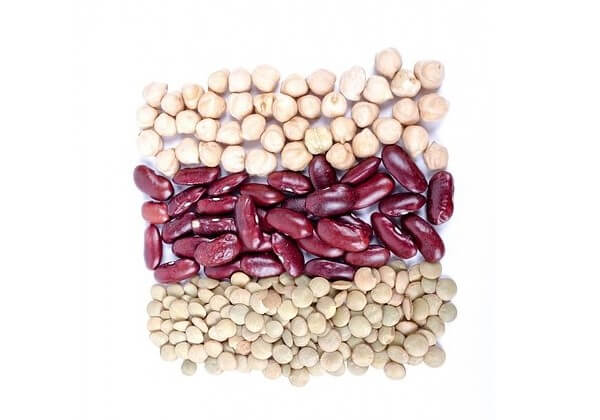
Yes, dogs can eat Chickpeas and lentils in moderation. Chickpeas and lentils are safe for dogs and can provide various nutritional benefits, including protein, fiber, and essential vitamins and minerals.
However, it’s crucial to ensure that the legumes are cooked and mashed or pureed before feeding them to your furry friends.
That’s because raw or uncooked legumes can cause digestive distress and lead to vomiting, diarrhea, or other gastrointestinal issues.
That said, it’s important to remember that Chickpeas and lentils should not make up the majority of a dog’s diet.
A balanced and complete diet for dogs should consist of high-quality protein, healthy fats, and essential vitamins and minerals that meet their specific nutritional needs.
Some essential vitamins that dogs need include vitamin A, which is crucial for healthy vision, skin, and immune function; vitamin D, which helps regulate calcium levels and supports bone health; and vitamin E, which acts as an antioxidant to protect cells from damage.
Our furry friends also need various B vitamins, including thiamine, riboflavin, niacin, and cobalamin, to support healthy metabolism, nervous system function, and energy production.
In addition to vitamins, our precious pups require several minerals to maintain their health.
Calcium is essential for bone and teeth health, while phosphorus supports healthy kidney function and cell growth.
Other critical minerals for dogs include magnesium, zinc, iron, and copper, which play essential roles in metabolism, immune function, and the formation of red blood cells.
It’s worth noting that the specific vitamin and mineral requirements for dogs may vary depending on factors such as age, breed, size, and activity level.
A balanced and complete diet that meets the nutritional needs of your canine friend’s specific life stage and health needs is essential to support their overall health and well-being.
If your K9 friend has any underlying health conditions, it’s always best to consult with your veterinarian before introducing any new foods to their diet.
So, can dogs eat Chickpeas?
Yes, dogs can eat Chickpeas if they are fully cooked and plain without any seasonings or added flavors. Before you feed your pooch canned Chickpeas, make sure to check the nutrition label and ingredients to see what the Chickpeas are soaked in. If the canned Chickpeas are canned in salt water or preservatives, avoid feeding them to your pooch.
Before feeding your four-legged friends Chickpeas, make sure the dried Chickpeas are fully cooked and not raw. Just like you wouldn’t eat raw Chickpeas, your K9 friends shouldn’t either.
If you’re thinking about feeding your pooch Hummus, don’t. The ingredients in Hummus are not healthy or safe for your pups to eat.
Lastly, you can definitely use Chickpea flour to make homemade dog treats. Chickpea flour is safe for dogs and many dog owners do use this as an alternative to wheat flour, especially if their pups are allergic to wheat or are sensitive to gluten.
DISCLAIMER: THIS WEBSITE DOES NOT PROVIDE MEDICAL ADVICE
The information, including but not limited to, text, graphics, images and other material contained on this website are for informational purposes only. No material on this site is intended to be a substitute for professional veterinary advice, diagnosis, or treatment. Always seek the advice of your veterinarian or other qualified health care provider with any questions you may have regarding dietary needs.
Resources:
https://en.wikipedia.org/wiki/Chickpea
https://foodprint.org/real-food/chickpeas/

With over five years of specialized experience as an animal writer, my expertise lies in dog nutrition, health, behavior, grooming, and training. I am dedicated to delivering helpful and informative content that caters to the well-being of our furry friends. My primary goal is to empower pet owners with knowledge and ensure our canine companions thrive in health and happiness. In my free time, I love volunteering at local dog rescue centers.
